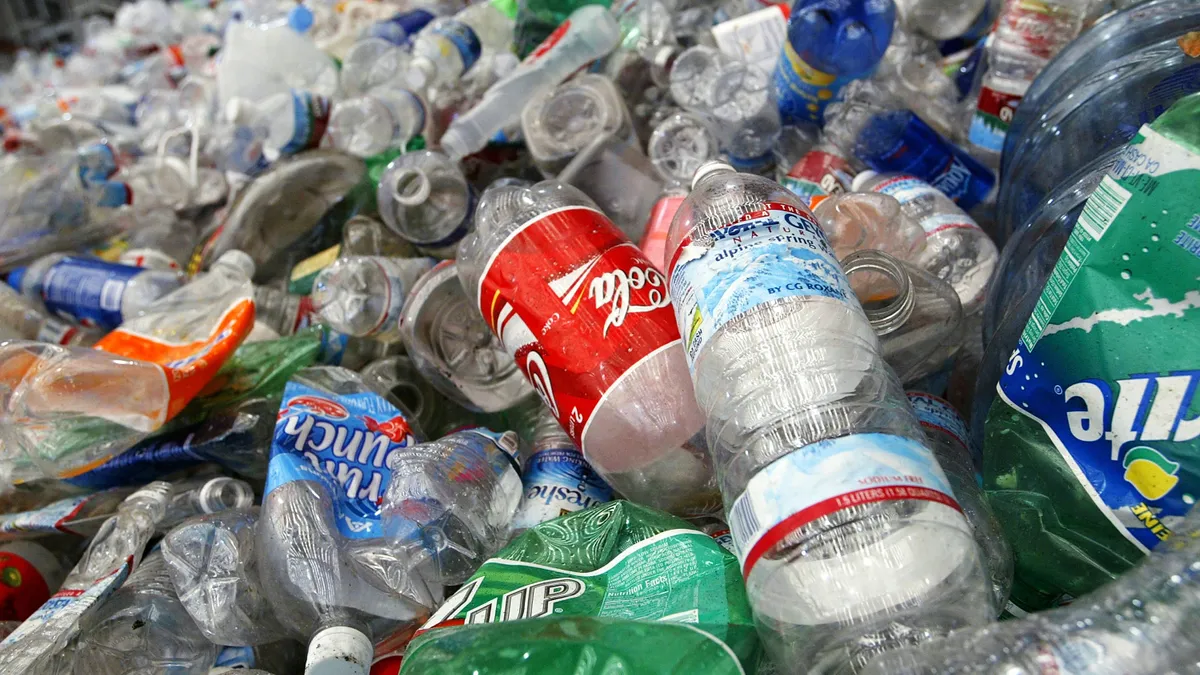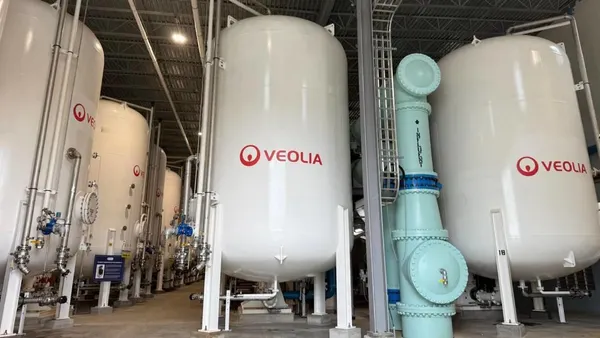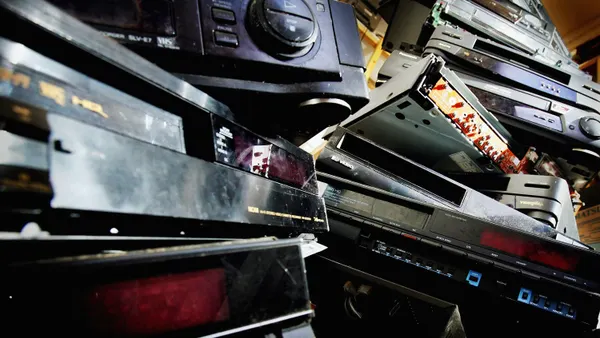Ron Gonen is well known for his ambitious and outspoken views on accelerating toward a more circular economy in the U.S. Now, he's written a book to lay out the economic and environmental case for these goals and why he feels the shift is long overdue.
"The Waste-Free World" opens with the story of New York's infamous Fresh Kills Landfill – once the largest in the world, but now a growing park – as an example of disposal culture's consequences as well as the possibilities of ecological regeneration. Gonen calls out companies and industries central to consumer culture as "waste profiteers," because they benefit from manufacturing and selling products but have little financial stake in managing them. Over the course of the book, he highlights consumer packaged goods (CPG) companies that have taken steps to profitably change their models and how "we can repudiate the gospel of waste and instead champion the ethic of circular consumption" in a new shift akin to the Industrial Revolution.
Gonen threads in stories from his life throughout, including co-founding Recyclebank, working at New York City's Department of Sanitation and launching the Closed Loop Fund. That latter role has made him particularly acquainted with the financial implications of changing systems around curbside recyclables, electronics, textiles, organics and many other key parts of the waste stream. Waste Dive recently spoke with the Closed Loop Partners CEO about his new book, thoughts on the waste industry, extended producer responsibility (EPR) policies, accountability in environmental, social and corporate governance (ESG) targets, and more.
This conversation has been edited for length and clarity.
WASTE DIVE: The book discusses how certain companies have been, in your view, "waste profiteers," and how this system is a "modern form of socialism" being taken advantage of by those who consider themselves free market capitalists. Would you include companies that run the landfills in that category as well?
RON GONEN: Yeah, companies that have a large portfolio of landfills, their core business model is to have municipal tax dollars pay to have products be put in their hole. I hope we get to an era of complete circularity, or complete zero waste, but along that journey we're going to need some form of landfills and we may always need some form of a landfill. But having a massive portfolio of landfills means that your business model is reliant on taxpayer dollars paying for the disposal of an ever-growing amount of stuff. If someone owns one landfill or two landfills, that's completely understandable and acceptable as part of a business model. But having a large portfolio of landfills and having your business based on landfilling, that I think is an antiquated business.
You also discuss the idea that using gross domestic product and consumption as key economic metrics may be problematic. Do you think that kind of volume-based system is also an issue for how waste and recycling companies measure their success?
GONEN: Yes, because you really want to move towards a system of quality over quantity. You're starting to see that. The reuse market in fashion and apparel, for instance, is exploding right now. There's a major interest in the electronics space around [repair]. The consumer goods space is starting to evaluate reusables as a way to deliver product. So I think the waste industry needs to be very mindful that the industries and the companies that have traditionally put products into market that ended up being collected and going to landfill, they are starting to transition to different models where more isn't necessarily better – a long-term relationship with the customer is better.
In the way you're seeing some CPG companies make those moves, do you think U.S. waste infrastructure can adapt to meet these changes? Or could new power structures and players emerge to provide these services?
GONEN: The industry needs to go through a transformation in order to keep up with what the consumer products and packaging industry is designing for. Ultimately the consumer products and packaging industry is the feeder to the waste industry, whether it's a landfill or recycling facility, and that consumer products and packaging industry is changing rapidly.
What's going to be interesting to see over the coming years is do the large public companies reinvent their model and adapt? Or is it the entrance of early stage, more innovative companies that end up becoming the dominant players? I don't think anybody has the answer to that. One of the large public companies could revolutionize itself and adapt and become a dominant player for many, many years – even more of a dominant player than it is today. Others could not adapt and fail, and you could have other new entrants into the market.
In recent years we've seen a wave of new ESG and climate pledges from some waste companies. Do you take that as them recognizing it's time to adapt? Or do you think there's another wave of change to come?
GONEN: In regards to the public companies, each company is very different in the industry. If you look at the three largest being Waste Management, Republic Services and Waste Connections, I think they've all been blessed with actually really good leadership over the last 10 to 20 years in terms of building shareholder value. I know Don Slager is retiring. I think he would be viewed as a very accomplished CEO in any industry in terms of the way he's been able to manage Republic and the returns he's been able to generate. It's really a question today of: the market is changing very rapidly, how do you now adapt as a public company or innovator in this market industry that's adapting?
The ESG space is one of those things that's pushing the industry to adapt, but I think that that ESG space is still really early and figuring out its own expression and what it wants. It's going to require some regulation to make sure that it's authentic in making sure it applies the capital it's raised to actually having impact.
In the book, you discuss how the former CEO of Puma and others view sustainability as not just a responsibility but an opportunity. With that in mind, it feels like a lot of targets set by major companies never get met. What changes this time, so five to 10 years from now we're not having the same conversation?
GONEN: I would say that if a target or commitment is not directly connected to a compensation package it's just either a PR gimmick, or an aspiration. That's the biggest change I think you're seeing today, is announcements from some major corporates that compensation packages are going to be tied to achieving certain goals around ESG or diversity or climate change. When you start to see that happen, then you start to feel confident that there are going to be concrete steps taken because people have the self-motivation within the company to affect that change.
It's still early, but we're starting to see that take place. I think the first step was really CEOs like Paul Polman at Unilever, who was way out in front of his industry in terms of acquisitions. He was making brands that were leaders in just changing the way his company and its supply chain was operating. He got a fair amount of criticism from some of his shareholders, had to fight back a hostile takeover from Heinz, but at the end of his 10-year tenure he had made them both the most sustainable company in the industry and had generated a 290% return for investors. I think that really raised people's eyebrows.
More companies are starting to make ESG commitments or have new ones – some of them are investing in Closed Loop – but they're not on that level with some ideas you just described. What do you think it takes for other major brands to evolve in that direction?
GONEN: I think it's very difficult for large organizations to go through major shifts that are being led by society. I think the leadership of those organizations are people that have come up working in a legacy system and only have a few years left before they retire. I don't think people realize how hard it is for an executive in their 50s or early 60s to decide that they're going to learn something new, adapt, merge their leadership skills that have gotten them to that point with these new learnings.
You really need an exceptional leader to be able to help a traditional large company go through that transition. But we're starting to see more and more of that. I think just like any seismic shifts that happen in the business world, some companies are going to be left behind, some companies are going to adapt and there's going to be new entrants into the market that will become big players. We're at the beginning stages of that type of transformation.
Would you consider policy a more adaptable way to do this? The book mentions the value of policy, calling out concepts such as right to repair and product bans, but doesn't get into details of others such as EPR, bottle bills or minimum content requirements. Where do you see those fitting?
GONEN: I think the consumer goods industry is becoming much more willing to accept some form of EPR. That could have a seismic impact on the industry, because that would all of a sudden provide a massive amount of funding to recycling and circular economy industries.
A lot of that is due to the number of industry players saying this infrastructure has got to get built and a good way to do that is by all of us contributing. And the good news is that's going to give us the ability to access more post-consumer recycled content. So effectively, we're just investing in our own infrastructure. I think that light bulb going off for CEOs — that EPR is actually just another term for investing in your own infrastructure — has helped generate some tailwinds.
I am supportive of EPR, as long as it's designed to achieve a goal, as opposed to being a perpetual tax on industry. It's really important for any EPR policy to define what is it trying to achieve. It's trying to achieve a certain recycling rate and use of recycled content rate. Once that's achieved, the EPR policy should disappear effectively. You structure it that way, you're going to get a lot of industry support. And you're going to get a lot of innovation from industry.
If you do what we've traditionally done with bottle bills, which I think have been totally ineffective – you're just taxing business and that money is going into some general fund, very little of which ends up actually being invested in recycling or circular economy infrastructure – then I would not be supportive. But I think we have a great potential to develop EPR policy now that would align everybody's interests.
Do you view this as remaining more of a state-by-state issue, or could you see any kind of national policy happening?
GONEN: If you see some combination of two or three larger states pass EPR I think you'll see a much stronger push, actually from industry, for federal EPR. Because when you have a state-by-state system it becomes very costly and confusing for both the company and the customer. So I think there is a high potential of the Biden administration getting something done on a federal EPR level, especially if they reach out and include industry on how to align everyone's interest, if a couple of states start getting legislation passed.
If something does happen, a discussion that comes up a lot is who is going to run the system and concerns about local control versus corporate control. Do you take any heed to those calls that having X beverage company come run the system may not be beneficial for everybody?
GONEN: Every time an entity touches the money, it's being diverted from where it should be invested, which is in local recycling infrastructure. And it can also make the allocation of capital more complex. So my suggestion is that whatever fees are collected locally should be the responsibility of the local municipality to choose how they want to be invested in local recycling infrastructure.
[For the most part] I don't think it should go back up to the state and then dispersed, or up to the federal government and dispersed, or to an industry trade group to decide how to disperse it.
You discuss some limitations local governments face based on your time working for New York. Recent budget challenges have made things additionally complicated. What do you see as their role right now?
GONEN: Local municipalities can be educating themselves about what are some of the better contracts and better operators out in the industry, and trying to attract those operators to their region or making sure their RFP is written to mimic some of the better contracts that are out in the market.
The diversity of tip fees that you see out in the United States for recycling is a clear example that something is not right with the industry. You literally have some municipalities paying 100% more in a tip fee than another municipality and getting less on the revenue share. There's some disparity when that's taking place.
[When National Sword happened] plenty of MRFs were fine continuing to sell their material domestically, because they'd been producing super high-quality bales for years that domestic markets wanted. But what most municipalities heard from their MRF operators was "we've got to redo the contract, can't sell to China anymore." What they were really saying, if you were on the municipal side and understood the industry, was "we never invested in the people, processes or technology to produce high-quality bales, because we could just ship them to China." That was an unfortunate thing.
The final piece of the equation is the consumer. People have some level of choice in what they buy and how they manage it, but we also hear a lot in climate change discussions about the need to focus less on personal responsibility than the upstream causes. Is that any different when it comes to recycling?
GONEN: I think when it comes to recycling decisions you have to make things convenient for the customer and you have to explain to the customer why you're asking them to do that. One of the tragedies of how waste has been structured in the U.S. is that it's not treated like a utility. It's treated as a cost of the commons. Therefore the responsible actor – ones who are saying I don't want my tax dollars going to landfill PET and HDPE and rigid polypropylene and aluminum and paper that I know my municipality can sell – they are responsible for subsidizing people who are being lazy, or want other people to share in the cost of their not having to recycle.
If you effectively had a nationwide pay-as-you-throw program, or made waste a utility, you would see behaviors change pretty dramatically because then you're effectively telling the citizen this is your individual cost. Now you can decide how you want to behave. You don't need to subsidize anyone else, and no one's going to subsidize you.











